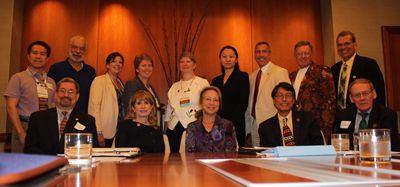Phi Tau Sigma Honor Society (Online Exclusive)
The Society continues its partnership with IFT while working on reactivating and creating Phi Tau Sigma Chapters at universities and colleges
In the United States, an Honor Society is an organization that recognizes excellence among peers. Fraternal Honor Societies often refer to scholastic honor, especially for undergraduate students at colleges and universities. Numerous societies exist that recognize various fields and circumstances, but Phi Tau Sigma is the only one specific to the field of food science and technology.
The purpose of Phi Tau Sigma—The Honor Society of Food Science and Technology—is to recognize and honor professional achievements of students and those beyond their student life at universities in food science and technology, and to enhance and elevate the profession of food science and technology.
Phi Tau Sigma is a body with its own elected officers and separate from other scientific professional organizations. However, Phi Tau Sigma partners with organizations, such as the Institute of Food Technologists (IFT). The following Phi Tau Sigma activities took place at this year’s IFT Annual Meeting & Food Expo:
Beginning with the 1984 IFT Annual Meeting & Food Expo, Phi Tau Sigma annually presents the Dr. Carl R. Fellers Award for “service to the field of food science and technology; and for bringing honor and recognition to the profession of food science and technology through a distinguished career displaying exemplary leadership, service, and communication skills that enhance the effectiveness of all food scientists in serving society.” The award is named for Carl R. Fellers, a food science professor who chaired the food technology department at the University of Massachusetts where the first Phi Tau Sigma Chapter was founded in 1953. The 2013 winner was Dennis R. Heldman, Professor of Food Engineering at The Ohio State University and Past President of Phi Tau Sigma and IFT.
- In 1978, the Phi Tau Sigma Graduate Paper Competition began at the IFT Annual Meeting. The competition included both written and oral presentations. At that time, the competition was open to any student who attended the IFT Annual Meeting. Six winners were selected across the United States and I am proud to say I was one representing the East Coast of the United States from Cornell University. Today, the Student Competition is still sponsored by Phi Tau Sigma but there were approximately 150 winning students recognized for their excellence in research in different specific disciplines of food science and technology (IFT Divisions) or by their written skills or oral presentation skills at the graduate and undergraduate levels.
- In 2012, a new tradition began thanks to Robert Shewfelt (Phi Tau Sigma Lifetime Member) and S. Suzanne Nielsen (immediate Past President of Phi Tau Sigma). Shewfelt and Nielsen worked with IFT’s Education Division to cosponsor symposia and provide recognition to the IFT Achievement Award Recipients. I attended the symposia for the last two years and I continue to be impressed by the relentless passion, history of innovative research, and commitment displayed by these special individuals who have given so much to food science and technology.
- In 2013, Phi Tau Sigma, for the first time, garnered the support and cooperation from the Council of Food Science Administrators. This powerful and influential group represents the Departments and Colleges of Food Science and/or Technology across the United States. Phi Tau Sigma was fortunate to cosponsor a number of sessions/workshops on professional/soft skill development this year. Again, attendance was high and discussion fervent. I can tell you that I believe the profession has a bright future and I feel fortunate to be included.
In 2013, Phi Tau Sigma took some time to honor Professor Owen R. Fennema, who passed away in 2012, with a special symposium and luncheon event. Both events were well attended, which is fitting because Fennema was an icon and trailblazer who committed half a century to food science and technology.
- Earlier this year, the Advisory Council of Phi Tau Sigma met after being dormant for a number of years. The energy and enthusiasm in the room was at an all-time high. Plans are underway to continue this exchange of information between and among the leadership of Phi Tau Sigma and its local Chapters. This event is open to all who have an interest in joining Phi Tau Sigma or becoming more active.
Strengthening the Chapters
From the events described above, it may seem that Phi Tau Sigma is visibly active. However, the main area of regeneration needed is in reactivating and, where necessary, creating Phi Tau Sigma Chapters at universities and colleges where excellent food science and technology programs exist. The Constitution and Bylaws Committee of Phi Tau Sigma was extremely active in 2012–13, taking on the daunting task of modernizing these key documents that had not been revamped in 60 years. There is still more work to be done in 2013–14, but under the leadership of Committee Chair Joe Regenstein, I know we will be able to move forward successfully.
Today, there are 40 Chapters of Phi Tau Sigma. While some are active and others are struggling, I continue to be impressed with the Chapters Affairs Committee and the innovative thoughts from the 2012–13 Committee Chair Christopher Daubert. He moved us forward and is now passing the reins to Emily Steinberg, whose energy will continue to recharge those Chapters in need and enhance communications between Chapters. The Chapters Affairs Committee will need the help of all members to get local Chapters fully active and to create Chapters where none currently exist. I urge you to assist where you can at the local level.
 Phi Tau Sigma is led by an Executive Committee, which is comprised of officers (President-Elect, President, Past-President, Treasurer and Executive Secretary) and six At-Large Councilors elected by active members of Phi Tau Sigma. In addition, the structure supports the establishment of local Chapters to encourage and promote the mission among students pursuing the study of food science and technology.
Phi Tau Sigma is led by an Executive Committee, which is comprised of officers (President-Elect, President, Past-President, Treasurer and Executive Secretary) and six At-Large Councilors elected by active members of Phi Tau Sigma. In addition, the structure supports the establishment of local Chapters to encourage and promote the mission among students pursuing the study of food science and technology.
All Phi Tau Sigma members (active and inactive) should become better acquainted with current activities by reviewing the contents of the recent and previous monthly newsletters at http://www.phitausigma.org/. These newsletters provide more details and background on the various initiatives being pursued by the leadership of Phi Tau Sigma. There is now an up-to-date Phi Tau Sigma Wikipedia site at http://en.wikipedia.org/wiki/Phi_Tau_Sigma. All members or potential members should contact me at [email protected] or Executive Secretary Kathryn L. Kotula at [email protected] to provide current contact information and consider becoming active members of Phi Tau Sigma, the Honor Society for Food Science and Technology.
Becoming a Member
According to the current Constitution and Bylaws, members can be nominated in writing by two members in good standing of Phi Tau Sigma. The nominations shall include an outline of the nominee’s qualifications for review and approval by the Membership and Qualifications Committee. Further details on membership, the nomination process and approval route can be obtained from the Membership and Qualification Committee, the website or Phi Tau Sigma’s Executive Secretary.
I look forward to my new role as President of Phi Tau Sigma and to interacting with each and every member. Email [email protected] with your comments, suggestions for improvement, questions, or concerns. These are exciting times for Phi Tau Sigma. Together we will enhance our chosen profession.
 Mary K. Schmidl,
Mary K. Schmidl,
IFT President 2000–01,
President (2013–14) of Phi Tau Sigma ([email protected]).
